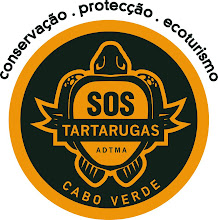 The vast majority of the rubbish that we collect on the east coast of Sal is discarded fishing line and plastic items such as bottles and other containers that are used as floats by fishermen. Turtles and other animals get entangled in this rubbish as it drifts through our oceans and without a good Samaritan to free them have little hope of surviving.
The vast majority of the rubbish that we collect on the east coast of Sal is discarded fishing line and plastic items such as bottles and other containers that are used as floats by fishermen. Turtles and other animals get entangled in this rubbish as it drifts through our oceans and without a good Samaritan to free them have little hope of surviving.This turtle was found by chance on the rocks near Igrijinha last week as a holidaymaker called Judith passed by. The net was entangled in her back flippers and the plastic container made it impossible for her to dive or swim, she had been thrown up on the rocks by the waves. Fortunately Judith was able to remove the net and floats and stressed and tired the poor turtle managed to crawl across the rocks until a big wave came and took her out to sea.
This turtle is not our usual loggerhead which nests here, but is a juvenile Olive Ridley, a type of turtle that we don't get to see very often but is present in the sea around Sal.
Really nice work, Judith!







No comments:
Post a Comment